GALLUP NEWS SERVICE
PRINCETON, NJ -- A recent Gallup survey finds that unlike the situation in Iraq, the issue of terrorism continues to favor President George W. Bush. A majority of Americans approve of the way the president is handling terrorism and believe that he, rather than likely Democratic presidential nominee John Kerry, would do a better job of handling the issue. By contrast, a majority of Americans disapprove of the way Bush is handling Iraq, and Americans are evenly divided as to whether Bush or Kerry would better handle that issue.
About 4 in 10 Americans assign at least a moderate amount of blame to the Bush administration for the 9/11 terrorist attacks, but about the same number also blame the Clinton administration. Most Americans, however, believe the 9/11 attacks could not have been prevented.
The poll, conducted June 21-23 (before the transfer of Iraq's sovereignty to local leaders), shows that 54% of Americans approve of the way Bush is handling the issue of terrorism. Bush's ratings on terrorism have clearly stabilized after showing a gradual decline since 9/11, dropping as low as 52% in the wake of the prisoner abuse scandal in Iraq. Bush's ratings had been above 60% from 2001 through 2003.
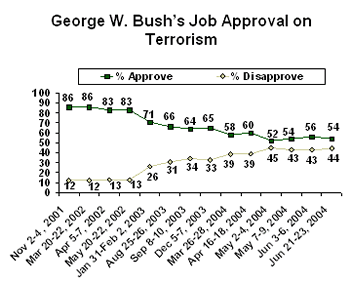
Nevertheless, his handling of terrorism remains a relative strength for Bush compared to his ratings on other issues. For example, only 42% of Americans approve of the way Bush is handling the situation in Iraq, and 56% disapprove. These figures have shown little change during May and June.
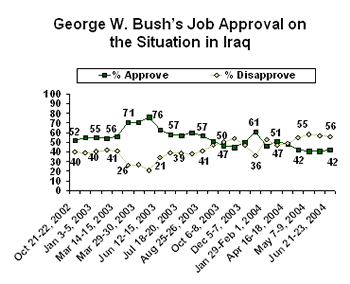
Additionally, Americans continue to believe that Bush would do a better job of handling the terrorism issue than would Kerry.
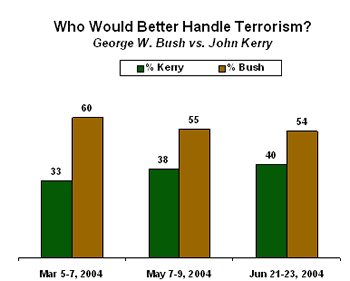
Since last March, the percentage favoring Bush over Kerry on handling terrorism has declined from 60% to 54%, while the percentage favoring Kerry has increased from 33% to 40%. Still, the current figures show a 14-point advantage for Bush.
Again, by contrast, Americans are divided on whether Bush or Kerry would do a better job in handling the situation in Iraq -- 47% say Bush, 46% say Kerry. In March, Bush enjoyed a 15-point advantage over Kerry on the Iraq issue, with 54% preferring the president and 39% favoring Kerry.
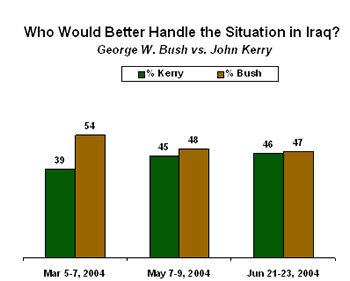
Sept. 11 Terrorist Attacks
Despite revelations about intelligence failures in the recently released 9/11 Commission report, most Americans believe that there was not sufficient information available to have prevented the terrorist attacks on Sept. 11, 2001.
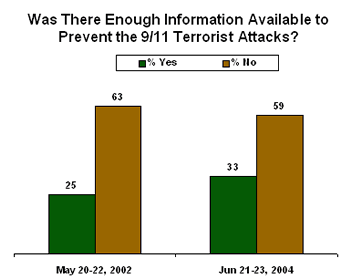
The percentage saying there was enough information is slightly higher now (33%) than two years ago (25%), when it was first revealed the Bush administration had some information about possible al Qaeda attacks in the United States before they occurred on Sept. 11, 2001. Still, by almost a two-to-one margin, Americans believe there was not enough information to thwart the attacks.
Americans are also about as likely to blame the Clinton administration as the Bush administration for the attacks. Overall, 42% say the Bush administration should be blamed at least a "moderate" amount, compared with 40% who say the same about the Clinton administration.
14. Overall, how much do you blame each of the following for the September 11th terrorist attacks -- a great deal, a moderate amount, only a little, or not at all? How about -- [RANDOM ORDER]?
A. The Bush administration
|
|
|
Moderate amount |
|
|
No |
|
|
% |
% |
% |
% |
% |
|
2004 Jun 21-23 |
17 |
25 |
23 |
34 |
1 |
|
|
|
|
|
|
|
|
2002 Jun 7-8 |
9 |
23 |
26 |
40 |
2 |
|
2001 Sep 14-15^ |
9 |
25 |
20 |
44 |
2 |
B. The Clinton administration
|
|
|
A moderate amount |
|
|
No |
|
|
|
% |
% |
% |
% |
% |
|
|
2004 Jun 21-23 |
13 |
27 |
24 |
34 |
2 |
|
|
|
|
|
|
|
|
|
|
2001 Sep 14-15^ |
16 |
29 |
18 |
34 |
3 |
|
|
^ |
Asked of a half sample. |
|||||
|
|
|
|||||
|
|
||||||
Survey Methods
Results are base on telephone interviews with 1,005 national adults, aged 18 and older, conducted June 21-23, 2004. For results based on the total sample of national adults, one can say with 95% confidence that the margin of sampling error is ±3 percentage points. In addition to sampling error, question wording and practical difficulties in conducting surveys can introduce error or bias into the findings of public opinion polls.
6. Do you approve or disapprove of the way George W. Bush is handling -- [RANDOM ORDER]?
B. The situation in Iraq
|
|
Approve |
Disapprove |
No opinion |
|
|
% |
% |
% |
|
2004 Jun 21-23 ^ |
42 |
56 |
2 |
|
|
|
|
|
|
2004 Jun 3-6 |
41 |
57 |
2 |
|
2004 May 7-9 ^ |
41 |
58 |
1 |
|
2004 May 2-4 |
42 |
55 |
3 |
|
2004 Apr 16-18 |
48 |
49 |
3 |
|
2004 Mar 26-28 |
51 |
47 |
2 |
|
2004 Jan 29-Feb 1 |
46 |
53 |
1 |
|
2004 Jan 2-5 |
61 |
36 |
3 |
|
2003 Dec 5-7 |
50 |
47 |
3 |
|
2003 Nov 3-5 |
45 |
54 |
1 |
|
2003 Oct 6-8 |
47 |
50 |
3 |
|
2003 Sep 8-10 |
51 |
47 |
2 |
|
2003 Aug 25-26 |
57 |
41 |
2 |
|
2003 Jul 25-27 |
60 |
38 |
2 |
|
2003 Jul 18-20 |
57 |
39 |
4 |
|
2003 Jul 7-9 |
58 |
39 |
3 |
|
2003 Jun 12-15 |
63 |
34 |
3 |
|
2003 Apr 14-16 |
76 |
21 |
3 |
|
2003 Mar 29-30 |
71 |
27 |
2 |
|
2003 Mar 24-25 |
71 |
26 |
3 |
|
2003 Mar 14-15 |
56 |
41 |
3 |
|
2003 Jan 31-Feb 2 |
54 |
42 |
4 |
|
2003 Jan 3-5 |
55 |
40 |
5 |
|
2002 Dec 9-10 |
55 |
39 |
6 |
|
2002 Oct 21-22 |
52 |
40 |
8 |
|
|
|||
|
^ Asked of half sample. |
|||
C. Terrorism
|
|
Approve |
Disapprove |
No opinion |
|
|
|
% |
% |
% |
|
|
2004 Jun 21-23 ^ |
54 |
44 |
2 |
|
|
|
|
|
|
|
|
2004 Jun 3-6 |
56 |
43 |
1 |
|
|
2004 May 7-9 ^ |
54 |
43 |
3 |
|
|
2004 May 2-4 |
52 |
45 |
3 |
|
|
2004 Apr 16-18 |
60 |
39 |
1 |
|
|
2004 Mar 26-28 |
58 |
39 |
3 |
|
|
2003 Dec 5-7 |
65 |
33 |
2 |
|
|
2003 Sep 8-10 |
64 |
34 |
2 |
|
|
2003 Aug 25-26 |
66 |
31 |
3 |
|
|
2003 Jan 31-Feb 2 |
71 |
26 |
3 |
|
|
2002 May 20-22 ^ |
83 |
13 |
4 |
|
|
2002 Apr 5-7 ^ |
83 |
13 |
4 |
|
|
2002 Mar 20-22 † |
86 |
12 |
2 |
|
|
2001 Nov 2-4 † |
86 |
12 |
2 |
|
|
|
|
|
|
|
|
^ |
Asked of a half sample |
|||
|
† |
WORDING: U.S. military action abroad to fight terrorism. |
|||
|
‡ |
Alternate wording asked in Nov. 2-4 and Mar. 20-22 poll produced similar results; data presented are the average of two wordings: "efforts to prevent future acts of terrorism in the U.S." and "U.S. military action abroad to fight terrorism." |
|||
BASED ON -- 521 -- NATIONAL ADULTS IN FORM B
A. The economy
|
|
Kerry |
Bush |
SAME (vol.) |
No opinion |
|
|
% |
% |
% |
% |
|
2004 Jun 21-23 ^ |
53 |
40 |
1 |
6 |
|
|
|
|
|
|
|
2004 May 7-9 ^ |
54 |
40 |
1 |
5 |
|
2004 Mar 5-7 |
50 |
42 |
2 |
6 |
|
|
||||
|
^ Asked of half sample. |
||||
B. The situation in Iraq
|
|
Kerry |
Bush |
SAME (vol.) |
No opinion |
|
|
% |
% |
% |
% |
|
2004 Jun 21-23 ^ |
46 |
47 |
1 |
6 |
|
|
|
|
|
|
|
2004 May 7-9 ^ |
45 |
48 |
1 |
6 |
|
2004 Mar 5-7 |
39 |
54 |
2 |
5 |
|
|
||||
|
^ Asked of half sample. |
||||
C. Terrorism
|
|
Kerry |
Bush |
SAME (vol.) |
No opinion |
|
|
% |
% |
% |
% |
|
2004 Jun 21-23 ^ |
40 |
54 |
1 |
5 |
|
|
|
|
|
|
|
2004 May 7-9 ^ |
38 |
55 |
1 |
6 |
|
2004 Mar 5-7 |
33 |
60 |
2 |
5 |
|
|
||||
|
^ Asked of half sample. |
||||
|
(vol.) Volunteered response |
||||
13. Do you think there was enough information available so that the terrorist attacks on September 11, 2001 could have been prevented, or not?
|
|
Yes, was |
No, was not |
No opinion |
|
|
% |
% |
% |
|
2004 Jun 21-23 |
33 |
59 |
8 |
|
|
|
|
|
|
2002 May 20-22 |
25 |
63 |
12 |
14. Overall, how much do you blame each of the following for the September 11th terrorist attacks -- a great deal, a moderate amount, only a little, or not at all? How about -- [RANDOM ORDER]?
A. The Bush administration
|
|
|
Moderate amount |
|
|
No |
|
|
% |
% |
% |
% |
% |
|
2004 Jun 21-23 |
17 |
25 |
23 |
34 |
1 |
|
|
|
|
|
|
|
|
2002 Jun 7-8 |
9 |
23 |
26 |
40 |
2 |
|
2002 May 16 ^ |
7 |
22 |
26 |
43 |
2 |
|
2001 Sep 14-15 † |
9 |
25 |
20 |
44 |
2 |
B. The Clinton administration
|
|
|
A moderate amount |
|
|
No |
|
|
|
% |
% |
% |
% |
% |
|
|
2004 Jun 21-23 |
13 |
27 |
24 |
34 |
2 |
|
|
|
|
|
|
|
|
|
|
2001 Sep 14-15 † |
16 |
29 |
18 |
34 |
3 |
|
|
|
|
|||||
|
^ Based on one-night poll. Polls conducted entirely in one day, such as this one, are subject to additional error or bias not found in polls conducted over several days. |
||||||
|
† Asked of a half sample. |
||||||
